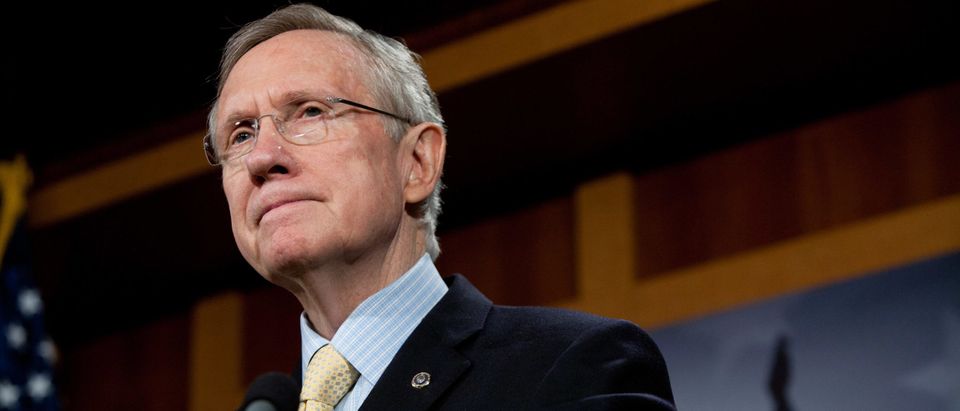The late Harry Reid returns to the U.S. Capitol this week to lie in state – the very place where he spent a significant portion of his adult life, serving the people of Nevada and his party as Senate majority leader. Reid was in the mold of another legendary Senate majority leader, Lyndon Johnson – someone for whom political power far outweighed any strongly held ideological beliefs.
Reid’s expedience sometimes led him to do the right thing, even if it didn’t come from a place of deep conviction. In the early to mid-1990s, as he was trying to climb the ranks of the Democratic leadership structure in the Senate, Reid recognized that immigration reform – i.e. controlling illegal immigration and moderating excessive legal immigration – was an issue that could win back Reagan Democrats who deserted the party in reaction to its leftward lurch of the 1970s and 1980s.
After three successive electoral routs, Bill Clinton was elected as a centrist. In his 1995 State of the Union address, President Clinton acknowledged the severe harm that large-scale illegal immigration was imposing on American workers and taxpayers. Long before Donald Trump’s border wall, there was the highly effective Clinton border wall near San Diego as part of Operation Gatekeeper, which he launched during his first year in office.
Gauging the political winds of the time, Reid rolled out the Immigration Stabilization Act of 1993. According to the preamble, the bill’s objectives were, “To curb criminal activity by aliens, to defend against acts of international terrorism, to protect American workers from unfair labor competition, and to relieve pressure on public services by strengthening border security and stabilizing immigration into the United States.”
A year later, as an overwhelming majority of California voters were poised to approve Proposition 187 – a grassroots initiative aimed at curbing illegal immigration – Reid published an op-ed in the Los Angeles Times in which he described the need to control our borders and moderate the intake of legal immigrants as a “moral imperative” and warned that the failure to act would constitute a “real injustice to future Americans.”
The bill, which represented the mainstream views of the Democratic Party at the time, ultimately failed under pressure from a powerful coalition of cheap labor business interests and ethnic interest lobby groups that has long stood in the way of sensible immigration reform. Nevertheless, the key provisions of Reid’s 1993 bill, with a few minor modifications, is a made-to-order response to the radical open borders, anti-enforcement (and wildly unpopular) immigration policies of the Biden administration.
Key provisions of the bill, laid out in a press release from Reid’s office included:
- “Reduc[ing] annual legal immigration levels from approximately 800,000 admissions per year (now in excess of 1 million)” to more historic norms.
- “Reform[ing] asylum rules to prevent aliens from entering the United States illegally under phony ‘asylum’ claims.”
- “Clarif[ying] that a person born in the United States to an alien mother who is not a lawful resident is not a U.S. citizen.”
- “Mandat[ing] that aliens who cannot demonstrably support themselves without public or private assistance are excludable.”
- “Increas[ing] border security and patrol officers.”
An updated Immigration Stabilization Act of 2022, with a nod to the late Senate majority leader and his party’s more rational past on immigration and border security, would provide a stark contrast to the disastrous and irrational current policies of the Biden administration. Such a bill would stand no chance of making it to the floor of the Senate, much less pass, under the current leadership. It would, however, force already nervous congressional Democrats to refute their own party’s mainstream positions of the recent past (including the once tough on illegal immigration Chuck Schumer just a few years ago) and defend the immigration chaos created by a deeply unpopular president as they approach the midterm elections.
With the strong likelihood of new leadership in both chambers of Congress in 2023, a reincarnated Reid bill could be politically relevant 30 years after he first proposed it. Whatever Reid’s motives were when he authored the Immigration Stabilization Act of 1993, it was a sound piece of legislation that truly advanced a range of important national interests. And, as the American public grows increasingly alarmed by consequences of the dangerous and destructive policies being zealously pursued by the Biden administration, a touched-up version of Harry Reid’s 1993 bill might be just what the public demands in 2023.
Dan Stein is president at the Federation for American Immigration Reform (FAIR) in Washington D.C.


